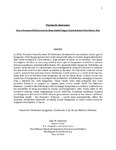Playing the Dam Game: How a Proposed Hydroelectric Dam Could Trigger Central Asia's First Water War (thesis)

View/
Author
Anderson, John W.
Subject
Washington and Lee University -- Honors in Interdisciplinary Work, The Williams School of Commerce, Economics and Politics
Utility theory
Water-supply -- Government policy
Uzbekistan
Kyrgyzstan
Metadata
Show full item recordDescription
Thesis; [FULL-TEXT FREELY AVAILABLE ONLINE] John W. Anderson is a member of the Class of 2016 of Washington and Lee University. In 2012, President Islam Karimov of Uzbekistan threatened to use military action against Kyrgyzstan if the Kyrgyz government went ahead with plans to build a large hydroelectric dam called Kambarata-1 and entrap a large amount of water on its territory. This paper investigates whether or not using military force against Kyrgyzstan would be a rational choice according to expected utility theory. The expected utility change for Uzbekistan on account of Kambarata-1's construction was investigated by using GIS software to estimate the size of the reservoir that would be created by the dam. The size of the reservoir can be used to estimate the economic losses Uzbekistan would endure as a result of having less water flow into its territory from Kyrgyzstan on the Syr Darya River. A small survey was conducted in Kyrgyzstan to investigate the probability of Uzbekistan emerging victorious from a bilateral war with Kyrgyzstan. These results were used alongside data from academic literature to support an original game theory model called The Mafioso's Dilemma. It predicts that Uzbekistan will not engage Kyrgyzstan in a military conflict due to the possibility of being punished by Russia and Kyrgyzstan's other treaty allies in the Collective Security Treaty Organization (CSTO). However, if political conditions changed and Kyrgyzstan did not have CSTO allies to guarantee its security in the future, a different theoretical model -- the Prisoner's Dilemma -- would more appropriately reflect the situation. Uzbekistan could then rationally invade Kyrgyzstan to secure water resources trapped in Kambarata-1's basin.